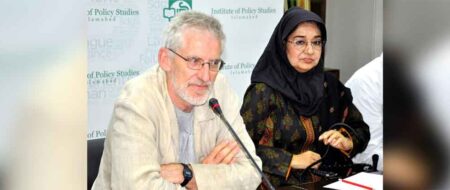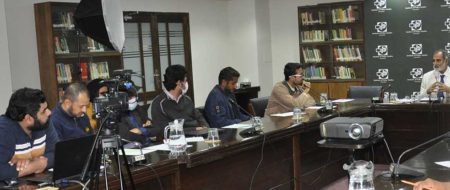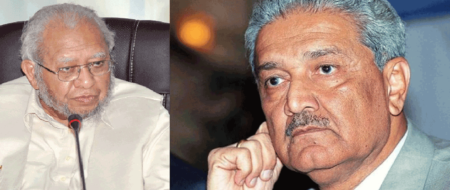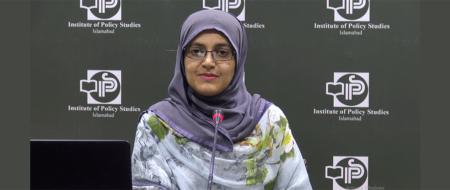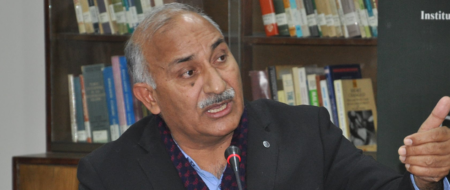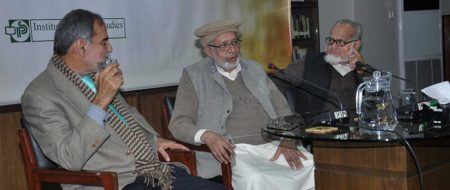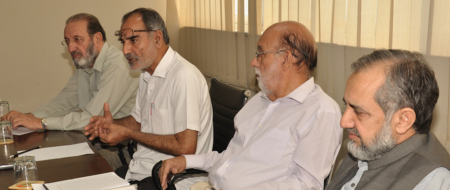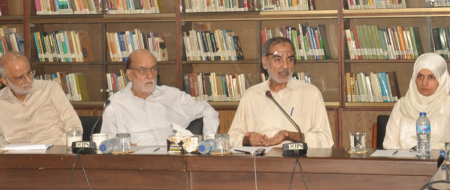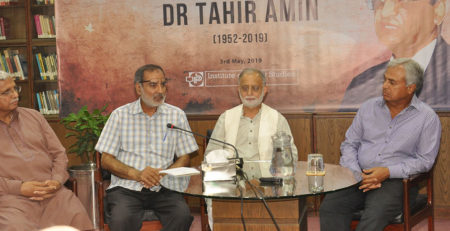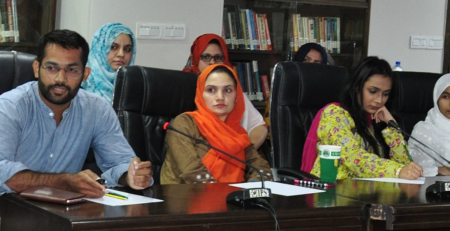Peace process initiated, led and owned by Afghans urged
Speakers at an interactive session held at the Institute of Policy Studies, Islamabad on 03 September 2012 stressed that Afghanistan has immense potential for all its neighbours especially India and Pakistan to shed their differences and make peace for a better and prosperous future.
- US cannot win Afghan war, neither Afghanistan’s armed opposition nor its neighbours: Dr Ghulam Farouq Azam
- Pakistan never wanted Afghanistan to be a subordinate entity; India should demonstrate true statesmanship on the issue: Tanveer Ahmed Khan
- Ball is in the American court: Dr Ghairat Baheer
Speakers at an interactive session held at the Institute of Policy Studies, Islamabad on 03 September 2012 stressed that Afghanistan has immense potential for all its neighbours especially India and Pakistan to shed their differences and make peace for a better and prosperous future. However, the peace process should be initiated, led and owned by Afghans.
The event was was chaired by former ambassador and foreign secretary Tanveer Ahmed Khan and addressed by Dr Ghulam Farouq Azam – an Afghan intellectual, former mujahid leader and twice minister in the Afghan national government post-USSR withdrawal – followed by an interactive discussion.

Presenting a futuristic view of Afghanistan, Dr Azam said that road and railway links from as far as Scandinavia and Far East were being planned to economically connect the world to Afghanistan. India desperately needs oil and gas from Central Asia, which will also come through Afghanistan and Pakistan.
The idea of the “northern silk route” was being aggressively pushed by the world powers, which makes Afghanistan all the more important strategically in the global arena. In this context both India and Pakistan have to secure their interests by ensuring peace in Afghanistan and also between them.
Dr Azam remarked, “Our neighbours have legitimate interests in the region, so does Afghanistan vice versa”.
He was of the view that America cannot win this war but this does not mean that the armed opposition or any of the neighbouring countries of Afghanistan can emerge as the winner. He said that after the defeat and withdrawal of USSR from Afghanistan, the Mujahideen did not win either and were not able to form a strong, consensus government. The neighbours of Afghanistan, too, did not gain anything. The same situation can happen again, he warned.

Stressing the need for an Afghan initiated and Afghan led peace process, he revealed that he along with some other key influential people in Afghanistan was working on a peace formula which would be honourable for all stakeholders.
“The majority should be able to accept and support it and those who do not like it should not feel marginalized”, he said.
He further informed that he has met Afghan President Hamid Karzai and other stakeholders in Afghanistan and has presented them with his proposals for the peace process and has been assured of their cooperation and support.

Participating in the discussion Dr. Ghairat Baheer, representative of Hizb-e-Islami cited the 15 point peace proposal given by his party and opined that the ball was in the American court with regard to peace in Afghanistan as the opposition forces were eager to bring genuine peace in the region.
He however noted that the opposition would neither lay down their arms nor accept the present Afghan constitution which was demanded by the USA as a pre-condition for talks. He said that he has met Afghan President Karzai several times himself and he feels that negotiations with the Afghan government were futile as it was a powerless government in this regard.
 |
 |
 |
 |
Baheer said that he has also met many US officials in Afghanistan and that the Americans have made it quite clear that they will not leave Afghanistan in the near future with their categorical statements such as, “We are not going to stay in Afghanistan permanently but we will remain there for a very long time,” and, “We will leave Afghanistan by 2014 but we will leave behind a sizeable number of non-combatant contingents”.
He claimed that after the withdrawal of USSR, the USA did not want the Mujahideen to take over Afghanistan and covertly connived with USSR and supported President Najeebullah to remain in power and was also behind the Ojhri Camp disaster and the mysterious assassination of General Zia-ul-Haq.
Chairman of the session, Tanveer Ahmad Khan said that the official policy of Pakistan, incidentally, was the same that it wanted the Afghan peace process to be initiated and led by the Afghans themselves!
He urged the regional countries to review their policies vis-à-vis Afghanistan and allow it to become independent, sovereign and prosperous. He was of the view that besides other forces, India being an important regional player should demonstrate true statesmanship in this context.
 |
 |
 |
 |
He remarked that he did not see any plans by Pakistan to make Afghanistan as a subordinate entity. An independent, prosperous and peaceful Afghanistan will naturally remain a good friend of Pakistan, he added.
With regard to the role of US in Afghanistan he said that America has abandoned nation-building projects and was indifferent towards the welfare of the people. He said the US wants to heighten the north-south divide in Afghanistan, however due to the rich historic background of the Afghan nation none of the ethnic group in the country will ever allow division of the land on ethnic or linguistic basis.
DG-IPS Khalid Rahman also spoke on the occasion and reiterated the Institute’s commitment to facilitate the Afghan peace process through applied research and meaningful dialogue.



